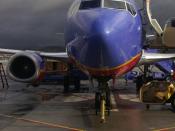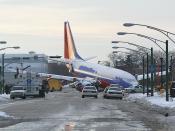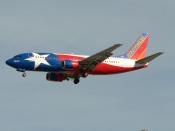EXECUTIVE SUMMARY
Southwest Airlines provides low-fare, no-frills, air transportation to fifty-eight cities in the United States. While competitors suffered tremendous loses or bankruptcy from the impact of September 11, 2001, Southwest Airlines has maintained its existence, profitability and its employee/customer service integrity. Electronic ticketing or on-line ticketing has been the most valuable asset for Southwest Airlines next to making their employees first priority over their customers. Over the years Southwest Airlines has expanded strategically and most recently has been offered expansion opportunities by over one-hundred cities. Southwest Airlines has proven to take advantage of opportunities like these and succeed because of the high-frequency, short hops at low prices they offer. Although other airlines have begun to incorporate Southwest Airlines strategies and values, Southwest Airlines still leads in maintaining the loyalty of their employees and in keeping their customers satisfied.
INTRODUCTION
The September 11, 2001 tragedy has left, what seems to be, irreversible affects on air transportation world-wide.
In the United States, consumers are selecting other methods of transportation before purchasing an airline ticket. However, in last few years their confidence in flying is increasing for economical reasons and because of low-fare competitive pricing.
One airline in particular, Southwest Airlines, has build a reputation of standing strong and being incredibly aggressive during trying times. This organization has been able to stay at the top of their industry primarily because of on-time flights; twenty-
minute turn-around/departure times; only operating out of small airports; exclusively using 737 aircrafts; providing short "no frills" flights; and because Southwest puts employees first before consumers. Because Southwest was adamant about maintaining these standards, in a way its contingency plan, it helped the organization grow and profit prior to September 11, 2001, providing an advantage over competitors that really didn't appear to have a contingency plan.


